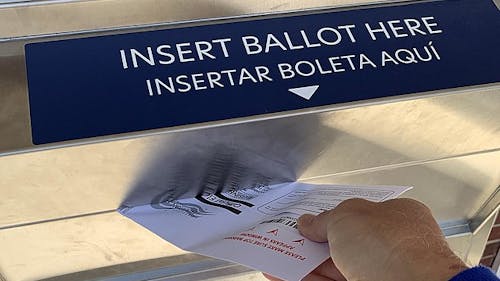Eagleton experts discuss new state law allowing 17-year-old voters to participate in primary elections

On January 4, Gov. Phil Murphy (D-N.J.) signed the New Voter Empowerment Act into law, permitting 17-year-olds to vote in state primary elections, provided that they will turn 18 before the November general elections, according to a press release.
Nineteen states have already adopted similar laws, and this new bill will take effect on Jan. 1, 2026.
Jessica Ronan-Frisch, the program manager at the Eagleton Center for Youth Political Participation, said the law could increase voter turnout in the long term.
She said young people voted at especially high rates in the 2020 general election and the 2022 midterm elections, and she predicts a similarly high turnout for this group of voters in the 2024 general election.
Lt. Gov. Tahesha Way (D-N.J.) also said that young voters have increasingly participated in the past few elections and that, in her role as the state's chief election officer, she has focused on this segment of the voting population, according to the press release.
"The New Voter Empowerment Act will bring New Jersey voters into the process earlier than ever before, helping young people build healthy civic habits and contribute to our democracy," she said in the release.
The law would allow younger voters to exercise voting habits ahead of the general election and make an impact at the local level, according to Ronan-Frisch. She said potential voters could take on a more active role in the primary election beyond registration.
Currently, individuals can register to vote at age 17 but cannot participate in any elections until they turn age 18, according to the release.
"It's really important because, a lot of times, these primary elections are really impacting people in local communities," Ronan-Frisch said.
Julia Sass Rubin, the director of the public policy program and the associate dean of academic programs at the Edward J. Bloustein School of Planning and Public Policy, said this law faced considerable pushback until Murphy postponed its effect to 2026.
She said that some politicians were concerned about the bill's partisan influence as typically, youth voters are considered to hold Left-leaning views. Rubin said the bill would likely affect primary elections more since general elections in New Jersey are not usually competitive.
"New Jersey is a state whose politics are controlled by political machines, and they like to know who's going to vote," she said. "And the primary is the most important election in New Jersey because we don't have very competitive general elections for the most part."
Like Ronan-Frisch, Rubin said participating in the electoral process at age 17 statistically increases the likelihood of instilling a voting tradition within the individual, especially as they may still reside with their parents.
When these voters enroll in higher education, they could face difficulties with voting, such as submitting an absentee ballot or commuting to the town in which they are registered to vote, Rubin said.
"To strengthen our democracy, we must ensure that all eligible voters can participate in it," Murphy said in the press release.



